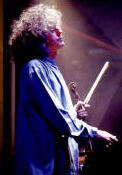Signed Branduardi
To listen to Bach,
being transported upward
 The
music, as we know it in the Occident, is today as the noise
of the traffic: we realize that it exists only when it stops.
Yet, about ten thousand of years ago, when the music was
born, it was tightly tied to spirituality.
The
music, as we know it in the Occident, is today as the noise
of the traffic: we realize that it exists only when it stops.
Yet, about ten thousand of years ago, when the music was
born, it was tightly tied to spirituality.
The first musicians were shamans. Chosen people able to
communicate «with the above». Partly, they still are. Even
if cultures have had different musical developments. Nobody,
for example, in Africa goes to listen to a «Mass of Requiem»
if there is not a corpse. For them - and for so many other
extraeuropean cultures - the music is tightly tied to the
quotidian. It is a deep expression of it. Not "only" company
or fun. And even "only" art.
This change in the European culture can be traced to 150
years ago. Before with Mozart and then with Beethoven music
has estranged from daily life to become art. Yet, this is
the true strength of music, it has not stopped producing
masterpieces full of spirituality. Rather: particularly,
European sacred music has touched high peaks, that have
crossed human confinements. When listening to Bach and even
certain pages of Wagner, that is considered by many a pagan,
the tears come to my eyes. I feel myself invested and
literally brought away. I feel the sense of the beyond. I am
not here and now, but from another part and in another
moment. Said so, perhaps it is fascinating. But to feel
music is an extremely individual experience. It’s made by
the individual and for the individual. In order to be
lowered in that “empty tree” that are Mozart and Bach, we
need an education to listening. Only then one succeeds in
gathering the pure transcendence that emanates from some of
their compositions. In those pages - according to the
moments and the state of mind - I reach different levels of
reading, partly even unconscious. I obviously find God there,
but also the cosmos, the Mystery, the Everything. Which
perhaps are the same thing. Because after all the point of
arrival of whatever spiritual music is the same, even if we
call it with different names. For this I don't have doubts:
the sacred music is the most beautiful music that there has
ever been in West.
It’s a pity that today only Arvo Pärt succeeds in still
saying extraordinary things with the sacred music. The true
problem, however, is another. I don't know if it could be
the Form able to unite the three great religions, but surely
it is difficult for music to furnish a real dialogue with
whom - belonging to other cultures - is not able to listen
to it. In regards to the whole respect I believe that an
Islamic, also moderate, has no interest for Bach. While any
curious occidental can listen to musics of the Islamic
tradition. Thinking that this dialogue is possible through
music is - in the best cases - a hope, obviously not a
certainty. I am not pessimistic, but realist. To the point
to believe that even the so-called “musica leggera”, that by
now has become a repetitive noise, has in itself an enormous
power. If only it didn't limit itself to look for the easy
broadcast consented to it. It could be an live expression
of our real life and even transcending the daily. Obviously,
also Bach has composed music «to live». But he has known
then how to touch unimaginable peaks. In our time, instead,
it seems that the musicians «shamans», able to communicate
with the transcendent one, don't succeed in raising the soul
anymore. Proper and other people's one.
Angelo Branduardi
From "Avvenire"
of the 03.26.2006